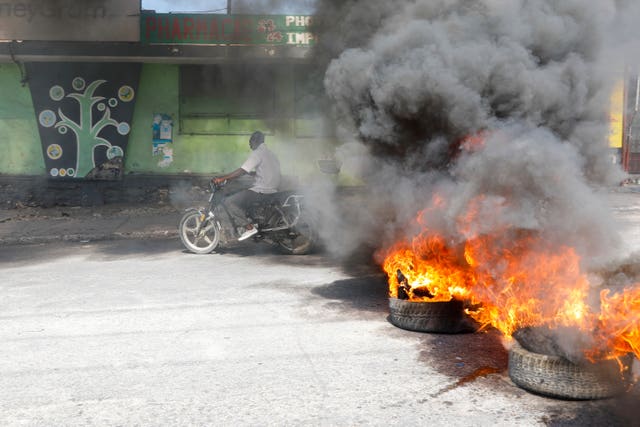
Heavily armed gangs have tried to seize control of Haiti’s main international airport, exchanging gunfire with police and soldiers in the latest attack on key government sites in an explosion of violence that includes a mass escape from the country’s prisons.
The Toussaint Louverture International Airport was closed when the attack occurred, with no planes operating and no passengers on site.
Associated Press journalists saw an armoured truck on the tarmac shooting at gangs to try to prevent them from entering airport grounds as scores of employees and other workers fled from whizzing bullets.
It is the biggest attack on the airport in Haiti’s history.
Last week, the airport was struck briefly by bullets amid ongoing gang attacks, but gangs did not enter the airport nor seize control of it.
The attack occurred just hours after authorities in Haiti ordered a night-time curfew following violence in which armed gang members overran the two biggest prisons and freed thousands of inmates over the weekend.
A 72-hour state of emergency began on Sunday night. The government said it would try to track down the escaped inmates, including from a penitentiary were the vast majority were in pre-trial detention, with some accused of killings, kidnappings and other crimes.
“The police were ordered to use all legal means at their disposal to enforce the curfew and apprehend all offenders,” said a statement from finance minister Patrick Boivert, the acting prime minister.
Gangs already were estimated to control up to 80% of the capital Port-au-Prince. They are increasingly co-ordinating their actions and choosing once unthinkable targets such as the Central Bank.

Prime Minister Ariel Henry travelled abroad last week to try to salvage support for a United Nations-backed security force to help stabilise Haiti in its conflict with the increasingly powerful crime groups.
Haiti’s National Police has roughly 9,000 officers to provide security for more than 11 million people, according to the UN. They are routinely overwhelmed and outgunned.
The deadly weekend marked a new low in Haiti’s downwards spiral of violence. At least nine people had been killed since Thursday — four of them police officers — as gangs stepped up co-ordinated attacks on state institutions in Port-au-Prince, including the national football stadium.
But the attack on the National Penitentiary late Saturday shocked Haitians who are accustomed to living under the constant threat of violence.
Almost all of the estimated 4,000 inmates escaped. Three bodies with gunshot wounds lay at the prison entrance on Sunday.
Among the few dozen people who chose to stay in prison are 18 former Colombian soldiers accused of working as mercenaries in the July 2021 assassination of Haitian president Jovenel Moise.
“Please, please help us,” one of the men, Francisco Uribe, said in a message widely shared on social media. “They are massacring people indiscriminately inside the cells.”

Colombia’s foreign ministry has called on Haiti to provide “special protection” for the men.
A second Port-au-Prince prison containing around 1,400 inmates was also overrun.
Gunfire was reported in several neighbourhoods in the capital. Internet service for many residents was down as Haiti’s top mobile network said a cable connection was slashed during the rampage.
After gangs opened fire at Haiti’s international airport last week, the US embassy said it was halting all official travel to the country. On Sunday night, it urged all American citizens to depart as soon as possible.
The Biden administration, which has refused to commit troops to any multinational force for Haiti while offering money and logistical support, said it was monitoring the rapidly deteriorating security situation with grave concern.
The surge in attacks follows violent protests that turned deadlier in recent days as the prime minister went to Kenya seeking to move ahead on the proposed UN-backed security mission to be led by that East African country.
Jimmy Cherizier, a former elite police officer known as Barbecue who now runs a gang federation, has claimed responsibility for the surge in attacks. He said the goal is to capture Haiti’s police chief and government ministers and prevent Mr Henry’s return.
The prime minister, a neurosurgeon, has shrugged off calls for him to resign and did not comment when asked if he felt it was safe to come home.


Comments: Our rules
We want our comments to be a lively and valuable part of our community - a place where readers can debate and engage with the most important local issues. The ability to comment on our stories is a privilege, not a right, however, and that privilege may be withdrawn if it is abused or misused.
Please report any comments that break our rules.
Read the rules hereLast Updated:
Report this comment Cancel